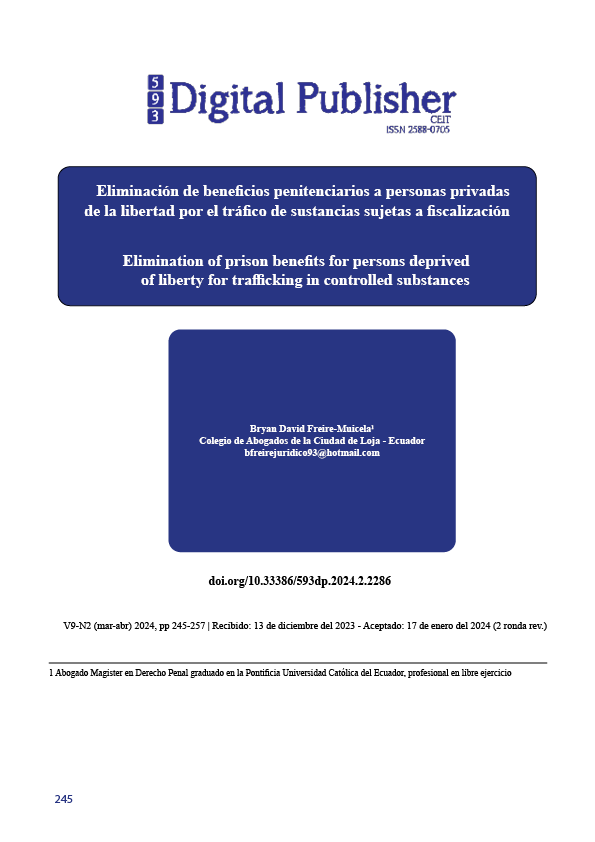Elimination of prison benefits for individuals persons deprived of their liberty for trafficking in substances subject to inspection
Main Article Content
Abstract
The scheduled substances subject to control are those listed in the annex to the Organic Law on the Comprehensive Prevention of the Socio -Economic Phenomenon of Drugs and the Regulation and Control of the Use of Scheduled Substances Subject to Control, which are classified as: a. Narcotics; b. Psychotropic; c. Chemical precursors; and, specific chemical substances. These substances are legally prohibited within the legal system since they do not allow people to actor develop in a normal and conscious manner, which is why these substances have led people to commit large -scale crimes such as drug trafficking, that is That is why the State must implement more drastic sanctions for people who commit this crime, since it is a crime that, when allowed to continue operating, will gain more strength every day until it reaches the point of becoming involved in the political coffers and operating from within a government, where its track.ing will be almost impossible, what is more, the State must eliminate the benefits that currently exist for those people who are sentenced for the crime of selling scheduled substances subject to control since the penitentiary benefit is the social rehabilitation process of the sentenced person who complies with the requirements and standards of the progressive system to carry out his or her activity outside the center for the execution of sentences in a manner controlled by the Technical Agency. Family, work, social and community integration activities will be carried out. These people must not only serve their entire sentence, but it must also be mandatory to pay for the damage done to the State. This crime covers a large number of crimes that come after the sale of drugs, but the most significant is that they attempt to against public health, a right enshrined in the constitution and a crime of outrage, the constitutional right should not have any benefit that the law grants.
Downloads
Article Details

This work is licensed under a Creative Commons Attribution-NonCommercial-ShareAlike 4.0 International License.
1. Derechos de autor
Las obras que se publican en 593 Digital Publisher CEIT están sujetas a los siguientes términos:
1.1. 593 Digital Publisher CEIT, conserva los derechos patrimoniales (copyright) de las obras publicadas, favorece y permite la reutilización de las mismas bajo la licencia Licencia Creative Commons 4.0 de Reconocimiento-NoComercial-CompartirIgual 4.0, por lo cual se pueden copiar, usar, difundir, transmitir y exponer públicamente, siempre que:
1.1.a. Se cite la autoría y fuente original de su publicación (revista, editorial, URL).
1.1.b. No se usen para fines comerciales u onerosos.
1.1.c. Se mencione la existencia y especificaciones de esta licencia de uso.
References
Álvarez -Echand i , l. (2020). El crimen orga niw do en el mercado ilícito de drogas . Quito : FLACSO Grafos S:A.
ARCSA. (2021). Agencia Nacional de Regulación, Control y Vigilancia Sanitaria. G uayaq uil . Barata, A. (2008). Criminología en el Sistema Penal . Bue nos Aires .
Bergman, M. (2016 ). Drogas, narcotráfico y poder en América Llltina. Argenti na : FCE - Fondo de
Cul tura Económic a.
CO NCEP. (2005). Ley de sustancias estupefacientes y. Quito .
Crespo , E. D. (1999). Prevención general e individualización judicial de la pena. Barce lona : Sala ma nca : Ed ici ones Un ive rsidad de Salamanca.
Donn a, Edgardo Alberto. (2006). Derecho Penal. Sa n ta Cruz: Ru bi nzal -C ulzoni. Es tado. (2020). Portal Unico de Tramites Ciudadanos .
F, M. (30 de 03 de 202 1 ). La mata n za en las cá rce les desató más viole ncia e n las calles; los . El comercio . Femández , E. (1983). EL CONT RACTUA LISMO CLASICO . Madrid: Ariel.
Francisco Manuel P iña Os un a, Juan Poom Medina. (201 9 ). Deterioro social y part ici pación en el tráfico de drogas en el estado de So nora. Revista internacional de fronteras, territorios y regiones , 22.
Juan José Rud a Sa nto lar ia, Fabiá n Novak. (2008). El tráfico ilícito de drogas en el Perú. Logroño.
Junior Jorge Hu a nacun i , Yud ith Ccuno Cond ori, Margoth Q uis pe Hu allpa , Jhimy Zona Gamic a. (201 9 ). EST U DlO DE CASO J.R.T.V. SO BRE EL DEU TO DETRÁFlCO lLÍClTO DE DROG AS Y SU RELAC lON CO NL A TRAT A DE PERSO NAS EN PUN O DESDE ELENFOQ UE DE LA
CR lMlN OLOGÍA CRlTl CA. Revista Derech , 1 2.
K, L. (2016). Criterios de valoración de la prueba e los delito de tráfico ilícit de sustancias catalogadas sujetas a fiscai zación. Qui to: .
Leonardo Raffo López y Die go Gómez Calde rón. (2017 ). REDES CRl MJN ALES Y CO RRUP CIÓ N EN LA ERA DEL MlCRO TR ÁFlCO Y EL N ARCO ME NUDEO. revista de economía institucional , 35.
Nacio nal , A. (2008). Art 364. Qui to .
Pazmi ño, K. (2016). tráfico de sustancias sujetas a fiscalización y el princiío de favorabilidad del procesado. Ambato.
Pé rez Luñ o, A. (1984). DERECHOS HUMANOS, ESTADO DE DEREC HO Y CONST ITUC ION . Madr id
: Tecnos .
Raggio , R . A. (20 L9). Lll pena y los intentos de justi ficación . . Ambato .
Rambal do, J. (2001 ). El abuso procesal. Bue nos Aires : Ru bin zal Cul zoni Edi tores. Ramos , l. A. (2022). MANUAL DE BENEFIC IOS PEN ITENC IARIOS. Quito .
Ríos, L. (1994). Lecciones del Derecho civil. Santiago: Jurídica de Chile. sali nas, B. y. (2014 ). Denegacion de las benicios pe nitenciarios . Quito.
Sampo , C. (2019 ). El tráfico de cocaí na entr e América Lati na y África Occidental. Revista latinoamericana de estudios de seguridad , 24.
Santiago, U. d. (M ie rcoles de 02 de 2016). Sentencias sobre drogas . (period ico , Entrevistador) valdés , Vent o, He rnandez , Alvarez . (2018 ). Drogas, un problema en la sal ud mundial . Revista
Uni versidad Médica Pinarel1a,, 183.


